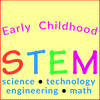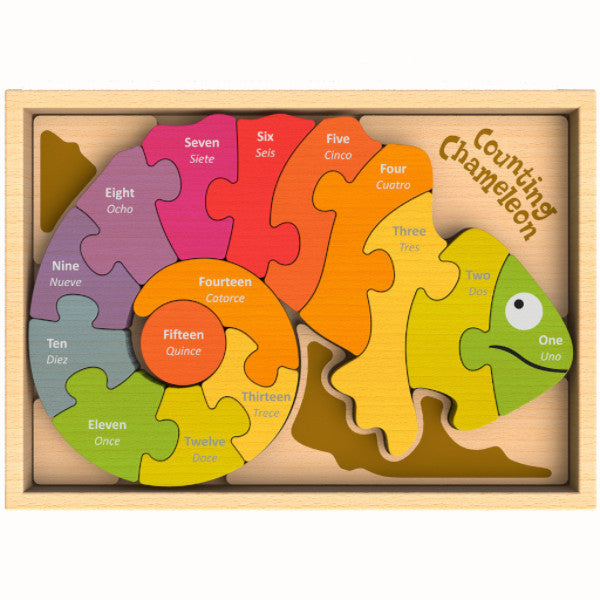Spanish Numbers - English Numbers Puzzle
Details
Uno, Dos, Tres ... One, Two, Three ... This chameleon of many colors is an award-winning spanish english puzzle. This numbers puzzle spells out number names in both English and Spanish on one side. The other side has the numbers 1-15 written in numeral form. So, a single piece provides three learning options (Example: 4, four, cuatro). Additionally, the pieces fit together in the form of the artist’s color wheel. Subconsciously, children have a color wheel puzzle.
Cut in a traditional jigsaw puzzle fashion, the 15 pieces are nearly an inch thick. This makes handling and manipulating these pieces easy-breezy for little hands. It comes with a beautiful natural beechwood tray. The tray creates orderly storage and easier travel.
This puzzle has high learning value in numeracy, language skills and problem-solving. It’s a numbers learning toy, a bilingual educational puzzle, a lesson in color theory and a colorful chameleon all-in-one. Little ones who enjoy exposure to new words and sounds have much to learn while having fun. No wonder this toy was a NAPPA 2014 Silver Winner.
Eco-Friendly Toy
Size: 10.5" x 7.5" x 1"
Age Range: 3-7 years
Award: NAPPA Silver Winner, 2014



Developmental Value
Early numeracy skills begin with recognizing numbers. With this puzzle, children can also build literacy skills in both English and Spanish by learning the written number words.
Puzzles are a problem-solving activity developing both analytic and creative thinking skills. Effective problem solving requires a controlled mixture of both analytic (left-brain activity) and creative (right-brain activity) thinking. Good problem solvers switch from one set of skills to the other. This is not always easy but becomes easier with problem-solving practice.
-
Logic skills are developed through ordering the pieces, comparing them, contrasting them, evaluating them and selecting the correct piece. The child must select the best alternative from the options available by narrowing down the range of possibilities (a convergent process).
-
Creative skills are developed when a piece doesn't fit because the child must consider a broader set of solving options such as manipulating the piece, flipping the piece, solving surrounding pieces or considering the numerical or color order.
Puzzle play requires visual spatial relationship reasoning, a cognitive function developed in relationship awareness of adjoining pieces. Spatial awareness is critical to fundamental mathematics comprehension.
Puzzles build attention span. They require concentration for completion. The key for the adult is finding the sweet spot of difficulty. If a puzzle is too easy, it requires little concentration. If it is too hard, the puzzle becomes a source of frustration. If it doesn't feel like play, the positive learning experience shuts down.
Puzzles become an opportunity for relationship building when adults provide encouragement and support.
The chameleon is camouflaged in color wheel sequence, providing early exposure to artist's color theory.
The puzzle parts are large and chunky supporting the clutching and manipulating of pieces, supporting the development of fine motor skill.
Because there is a carrying tray, this puzzle becomes a travel toy for activities away from home. For homes who focus on Montessori shelving with work options, this puzzle sits orderly in its box.
Manufacturer
Located in Fort Collins, Colorado, BeginAgain believes in hands-on experiential toys, devoid of batteries. BeginAgain also has a strong commitment to eco-friendly products. Their entire line of products is made from plant-based materials.
This durable wooden puzzle is handcrafted from sustainable plantation-grown trees. BeginAgain chooses to use rubberwood (hevea brasiliensis) because it grows quickly. A strong hardwood, it is an excellent material for making heirloom quality toys.
The puzzle was designed in Fort Collins, Colorado. Manufacturing near the native source of the wood, allows for smarter, more efficient use of energy, reducing the shipping footprint. The puzzles are packaged back in the USA, ensuring quality control. The manufacturing partner is female owned, and family run. The factory believes in the principles of fair living wages and sustainable practices. Independent audits ensure fair working conditions, product safety, and quality control standards.





